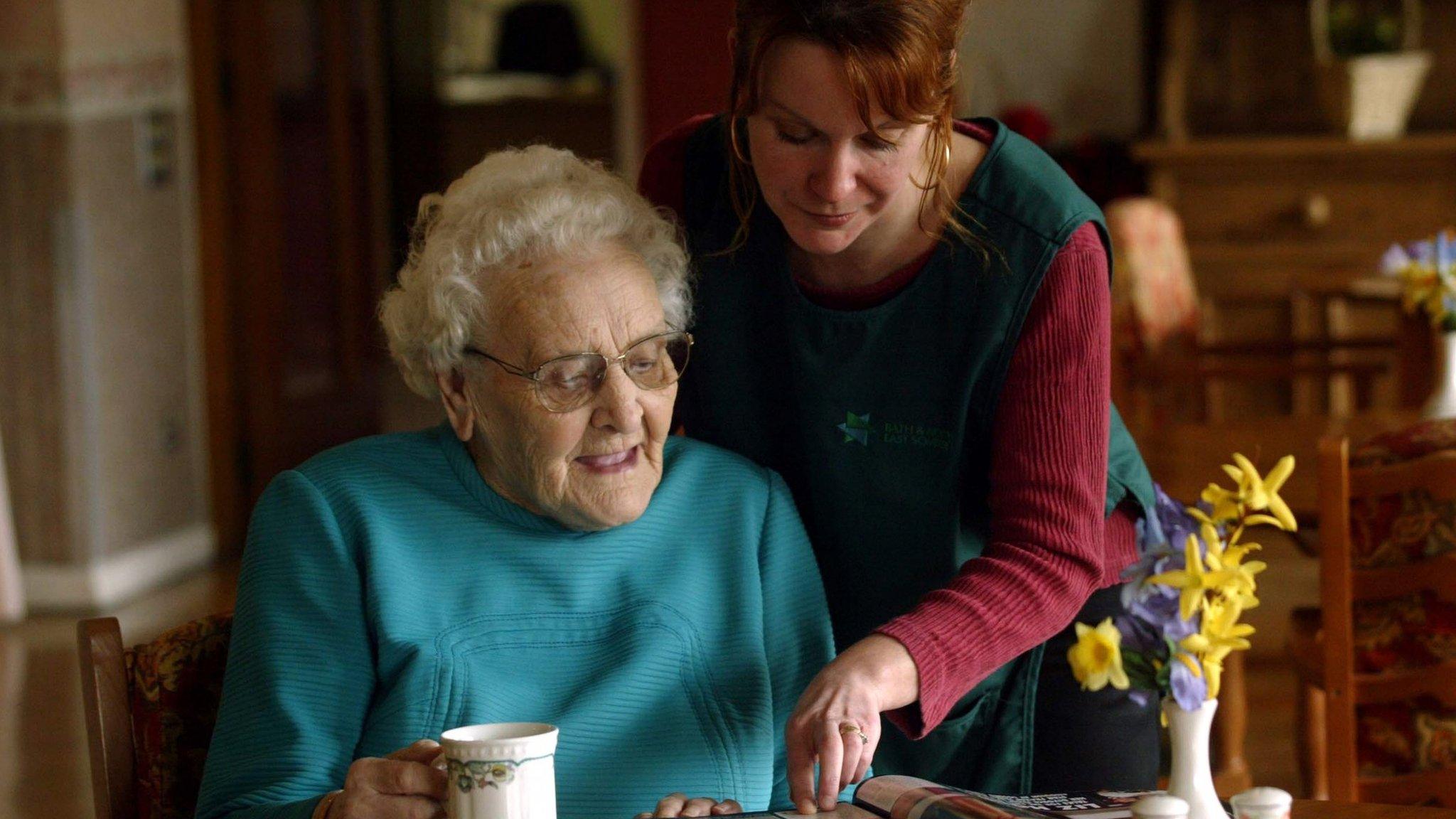Council staff will not transfer to new care service
- Published

The government wants to end the postcode lottery in adult care provision across Scotland
The Scottish government has ruled out transferring up to 75,000 staff from local authorities to new care boards as part of its National Care Service plan.
Cosla, which represents local authorities, had warned that any such move would put the delivery of vital services at risk.
An agreement has now been reached that means National Care Service staff will continue to be employed by councils.
Councils will also responsible for buildings and the delivery of services.
The proposals for a new care service have been mired in controversy, with the government delaying its plans to introduce the legislation needed to create it until after the summer.
It said the delay would allow for talks to take place to decide on the best way forward.
The government has now agreed a partnership deal with Cosla and the NHS which it hopes will address some of the concerns that had been raised about the new service.
Under the terms of the agreement, legal responsibility will be shared between the health service, councils and the Scottish government.
Social care minister Maree Todd said the detail of how this will work in practice would be developed in the coming months, with parliament being updated on progress after the summer recess.
Paul Kelly, the health and social care spokesman at Cosla, had previously described the national care service as a "distraction" and called on the government to instead focus on giving councils enough resources to properly deliver adult care services.
Mr Kelly said the new agreement would ensure a balance was struck between improving care services across Scotland while reflecting the diverse needs of local communities.
He added: "We hope by setting out the continued role of local authorities in delivering social care and social work functions, and staff remaining employed within councils, we offer comfort and stability to the local government workforce."
But Mr Kelly stressed that there was "more to do", and pledged to continue working towards ensuring that the new system "ensures individuals and communities always experience high quality care and support".


Today's announcement that local authorities will continue to be at the heart of delivering care and that their staff will not risk being transferred to care boards will be seen as a win for local authorities.
They had argued that this could seriously undermine the delivery of vital social care services.
It is an effort by the government to find a way forward for its troubled National Care Service Bill. It has faced fierce criticism from many organisations over its lack of detail on cost and delivery.
The government and social care minister are also spending the summer on a tour of Scotland, at events to hear more about what people expect and want from a National Care Service.
It's all part of what Maree Todd says is to "find compromise and reach consensus with those who have raised concerns".
But there are still unanswered questions about what exactly centralised care boards will be required to do, how much it will actually cost, and how people who are in need of social care - both now, and in the future - will be better served.

The agreement was also welcomed by unions, with the STUC describing it as a "a much needed first step".
Its general secretary Roz Foyer said: "This deal is testament to our collective campaigning, ensuring care workers will now remain employed by local authorities and that councils still retain a key role in delivering local care.
"As we build a National Care Service worthy of social care staff, we must ensure any new system is not-for-profit and unequivocally guarantees workers national collective bargaining, decent conditions and fair wages for all."
Scottish Labour deputy leader Dame Jackie Baillie said the agreement was an "acknowledgement from the Scottish government that their plan to run roughshod over local accountability and decision-making for social care services was never going to work and amounted to little more than a power-grab".
The government believes the National Care Service is needed to end the postcode lottery in care provision across Scotland, and has described the proposal as being the most significant change to care in Scotland since the creation of the NHS.
It will see the setting-up of a series of care boards that operate in the same way as health boards, with Scottish ministers directly responsible.
However, opponents had described it as a government "power grab" and an "all-out assault on local democracy".
Concerns have also been raised about the cost of creating the new service, with Audit Scotland saying it was likely to be far more than the £500m that had been estimated.
Related topics
- Published8 November 2022

- Published1 March 2023
